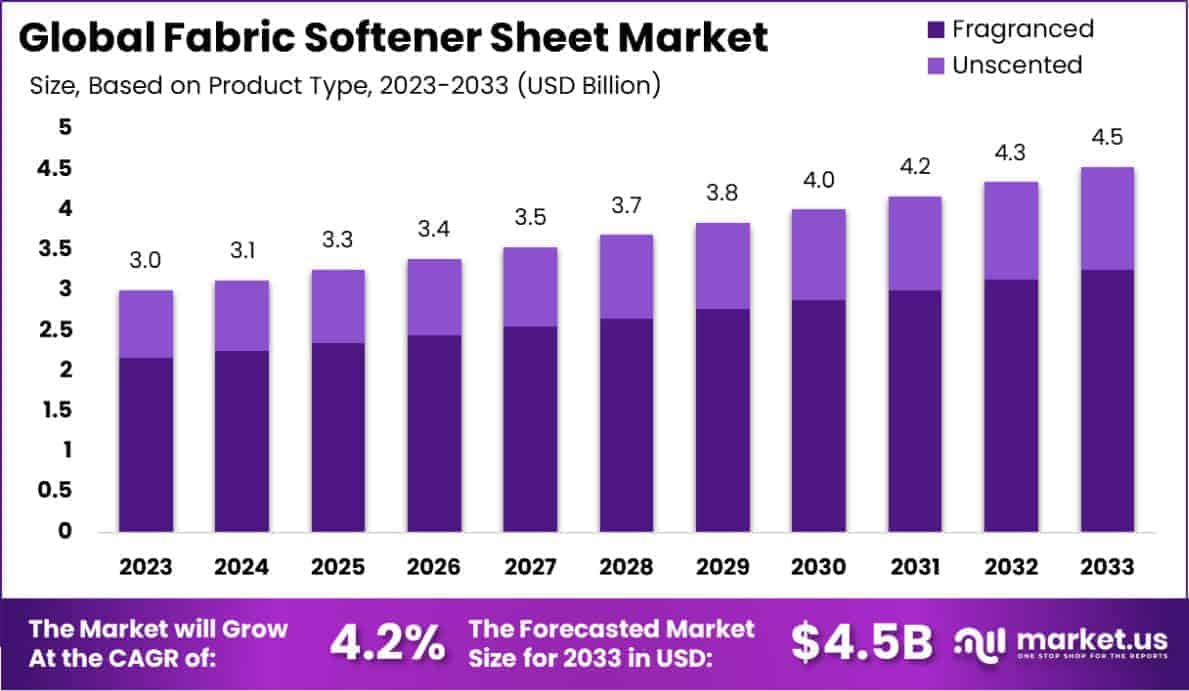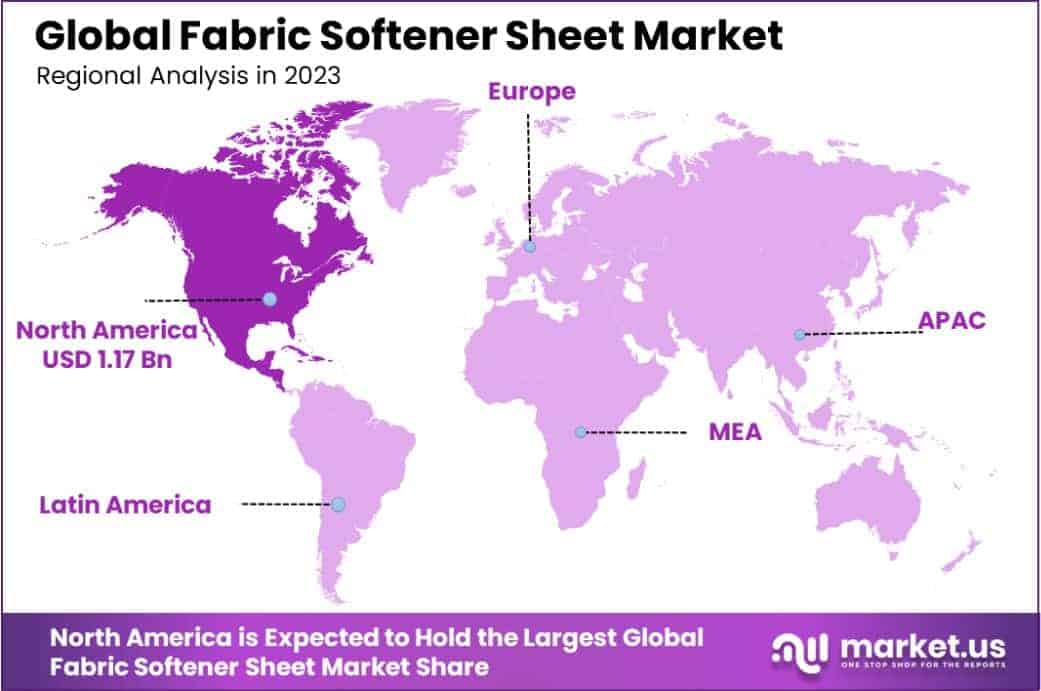Table of Contents
Introduction
The Global Fabric Softener Sheet Market is projected to reach approximately USD 4.5 billion by 2033, increasing from USD 3.0 billion in 2023. The market is expected to grow at a compound annual growth rate (CAGR) of 4.2% during the forecast period from 2024 to 2033.
The Fabric Softener Sheet Market is experiencing steady growth, driven by increasing consumer preference for convenient and efficient laundry care solutions. Fabric softener sheets are thin, disposable sheets infused with conditioning agents, designed to reduce static cling, soften fabrics, and impart a pleasant fragrance when placed in a dryer during the laundry cycle. The market is expanding due to rising urbanization, growing disposable incomes, and an increasing focus on fabric care and hygiene.
The demand for fabric softener sheets is further fueled by their ease of use compared to liquid fabric softeners, making them a preferred choice among busy households and professionals. Additionally, the surge in e-commerce platforms has provided greater accessibility to a wide variety of products, including organic and eco-friendly fabric softener sheets, catering to the rising consumer preference for sustainable and chemical-free alternatives.
Growth factors include heightened awareness regarding garment longevity, increasing demand from commercial laundries and hospitality sectors, and innovations in biodegradable and fragrance-free options to appeal to environmentally conscious consumers. Market opportunities lie in product diversification, including hypoallergenic variants and region-specific fragrances, as well as strategic collaborations between manufacturers and retail chains to enhance product penetration.
The shift towards sustainable laundry care solutions, coupled with aggressive marketing strategies by key players, is expected to create lucrative growth avenues in the coming years. As consumers seek greater convenience without compromising on quality, the fabric softener sheet market is projected to witness significant expansion across both developed and emerging economies.

Key Takeaways
- The global fabric softener sheet market is projected to reach USD 4.5 billion by 2033, growing from USD 3.0 billion in 2023, at a CAGR of 4.2% during 2024–2033.
- Fragranced fabric softener sheets accounted for 72.1% of the market share in 2023, maintaining a dominant position.
- Liquid-based fabric softener sheets led the market with a 37.3% share in 2023.
- Laundromats held a dominant position in the fabric softener sheet market in 2023.
- Supermarkets and hypermarkets remained the leading distribution channel in 2023.
- North America dominated the market with a 39.1% share, generating USD 1.17 billion in revenue in 2023.
Report Scope
| Report Features | Description |
|---|---|
| Market Value (2023) | USD 3.0 Billion |
| Forecast Revenue (2033) | USD 4.5 Billion |
| CAGR (2024-2033) | 4.2% |
| Segments Covered | Based on Product Type (Fragranced, Unscented), Based on Formulation (Liquid, Dryer), Based on Application (Household Use, Hotels, Restaurants, Hospitals, Laundromats), Based on the Distribution Channel (Supermarkets and Hypermarkets, Convenience Stores, Online Retail, Specialty Stores, Department Stores, Direct Sales, Others) |
| Competitive Landscape | Procter & Gambl, Unilever, RECKITT BENCKISER GROUP PLC., HENKEL AG & CO. KGaA, COLGATE PALMOLIVE COMPANY, MARICO LTD., LG Household & Health Care Ltd., PIGEON CORPORATION, Church & Dwight Co., Inc., MELALEUCA, INC., Other Key Players |
Emerging Trends
- Eco-Friendly Products: There is a growing consumer demand for environmentally friendly fabric softener sheets made from biodegradable materials and natural ingredients.
- Natural Fragrances: Consumers are increasingly preferring fabric softener sheets with natural and plant-based fragrances over synthetic scents.
- Convenience: The convenience of using fabric softener sheets, which eliminate the need for liquid softeners and dispenser balls, is driving their popularity.
- Premium Products: There is a rising demand for premium fabric softener sheets that offer additional benefits such as long-lasting scents and advanced fabric care.
- Health Considerations: Some consumers are seeking hypoallergenic fabric softener sheets due to sensitivities or allergies to certain chemicals.
Top Use Cases
- Household Laundry: Fabric softener sheets are primarily used in households to soften fabrics, reduce static cling, and add fragrance to clothes and linens.
- Laundromats: Laundromats utilize fabric softener sheets to enhance the laundry experience for customers by providing softer and fresher clothes.
- Hospitality Industry: Hotels and restaurants use fabric softener sheets to maintain the quality and comfort of their linens and uniforms.
- Healthcare Facilities: Hospitals and clinics employ fabric softener sheets to ensure that bedding and patient gowns are soft and comfortable.
- Industrial Applications: Certain industries use fabric softener sheets in the maintenance of uniforms and protective clothing to enhance comfort.
Major Challenges
- Environmental Concerns: The use of non-biodegradable materials in some fabric softener sheets raises environmental issues.
- Health Risks: Certain chemicals in fabric softener sheets may cause skin irritations or allergic reactions among sensitive individuals.
- Competition from Alternatives: Products like liquid fabric softeners and dryer balls offer similar benefits, posing competition to fabric softener sheets.
- Cost Considerations: The ongoing expense of purchasing disposable fabric softener sheets may deter budget-conscious consumers.
- Performance Perception: Some consumers perceive fabric softener sheets as less effective compared to liquid alternatives, impacting their popularity.
Top Opportunities
- Sustainable Products: Developing eco-friendly and biodegradable fabric softener sheets can attract environmentally conscious consumers.
- Hypoallergenic Options: Offering hypoallergenic fabric softener sheets can cater to consumers with sensitive skin or allergies.
- Innovative Fragrances: Creating unique and long-lasting natural fragrance options can differentiate products in the market.
- Value Packs: Providing larger or value packs can appeal to cost-conscious consumers seeking economical options.
- Marketing Campaigns: Educating consumers about the benefits and proper use of fabric softener sheets can enhance market penetration.
Key Player Analysis
The Global Fabric Softener Sheet Market in 2024 is characterized by strong competition among key players, with established multinational corporations leveraging brand loyalty, innovation, and extensive distribution networks. Procter & Gamble and Unilever continue to dominate, driven by their robust product portfolios and global presence. Reckitt Benckiser Group PLC. and Henkel AG & Co. KGaA focus on premiumization and eco-friendly formulations, aligning with the rising consumer preference for sustainable solutions. Colgate-Palmolive Company and Marico Ltd. strengthen their foothold through regional expansion and product diversification.
LG Household & Health Care Ltd. and Pigeon Corporation drive market growth in Asia, emphasizing premium and baby-safe formulations. Church & Dwight Co., Inc. and Melaleuca, Inc. capitalize on niche consumer segments, particularly in the organic and hypoallergenic categories. The market remains dynamic, with smaller players innovating to challenge incumbents, while sustainability, fragrance innovation, and cost-effectiveness continue to shape competition.
Top Key Players in the Market
- Procter & Gamble
- Unilever
- RECKITT BENCKISER GROUP PLC.
- HENKEL AG & CO. KGaA
- COLGATE PALMOLIVE COMPANY
- MARICO LTD.
- LG Household & Health Care Ltd.
- PIGEON CORPORATION
- Church & Dwight Co., Inc.
- MELALEUCA, INC.
- Other Key Players
Regional Analysis
North America Leads Fabric Softener Sheet Market with Largest Market Share of 39.1% in 2024
North America dominates the global fabric softener sheet market, accounting for 39.1% of the total market share in 2024. The region’s market is valued at approximately USD 1.17 billion, driven by high consumer preference for convenient laundry solutions and premium household care products. The strong presence of key market players, coupled with increased spending on home and fabric care products, has contributed to sustained market growth.
The U.S. remains the largest contributor within the region, supported by a well-established retail distribution network and rising demand for eco-friendly and biodegradable fabric softener sheets. Additionally, the increasing inclination toward fragrance-enhanced and skin-sensitive fabric softener sheets has fueled product innovation. The growth trajectory in North America is further reinforced by the widespread availability of premium and private-label brands across supermarkets, hypermarkets, and online retail platforms.

Recent Developments
- In 2023, Arm & Hammer introduced Power Sheets Laundry Detergent, marking its entry into the sheet detergent category on Amazon in the U.S. As part of Church & Dwight, the brand launched this innovative product featuring “Quick Dissolve” technology, ensuring effective cleaning even in cold water. Designed for convenience, the detergent sheets provide a mess-free alternative to liquid or powder options, with a fresh linen scent enhancing the laundry experience.
- In 2024, Tide unveiled Tide evo at SXSW, introducing a cutting-edge tile format for laundry detergent. Developed after extensive research, this new detergent form consists of layers of concentrated cleaning ingredients packed into fiber-based tiles. Each tile dissolves instantly in water, delivering powerful stain removal while reducing unnecessary liquid and fillers. Tide evo aims to redefine efficiency in laundry care, making the process simpler and more sustainable.
- In 2023, Soupline, a Colgate-Palmolive brand, launched the first-ever softening tablets, offering a new way to enhance fabric care. The development stemmed from consumer insights, prioritizing ease of use and effectiveness. According to Abraham Cazes, Senior Director of Home Care R&D, the goal was to design a product that meets real consumer needs rather than assumptions. These compact tablets dissolve quickly, providing long-lasting softness and fragrance without the hassle of measuring liquid fabric softener.
Conclusion
The fabric softener sheet market is set for steady growth, driven by convenience, rising urbanization, and increasing focus on fabric care. Demand for eco-friendly and biodegradable options is shaping innovation, while key players invest in product diversification and strategic partnerships. Expanding e-commerce and retail networks further enhance market penetration, ensuring continued growth across regions.
Discuss your needs with our analyst
Please share your requirements with more details so our analyst can check if they can solve your problem(s)





